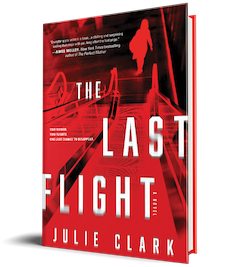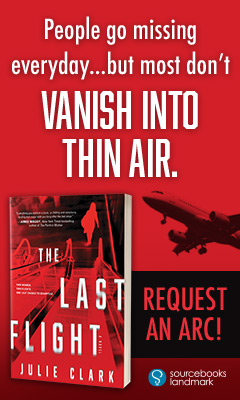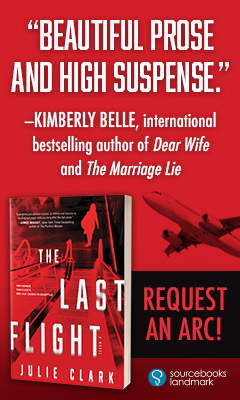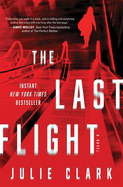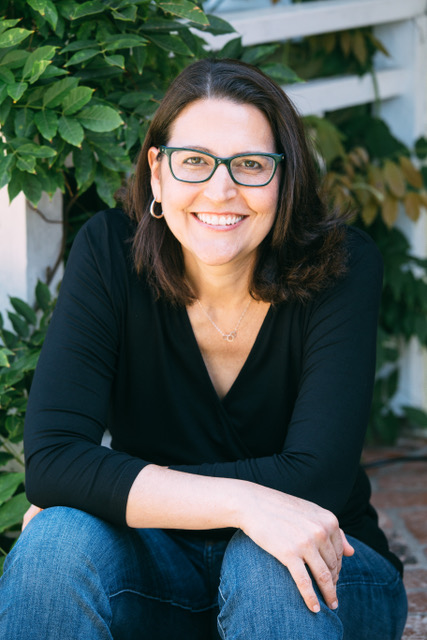The Last Flight
by Julie Clark
Claire Cook lives a glamorous life in Manhattan with her handsome husband, Rory, beloved son of a political dynasty. They reside in an old-money townhouse with a staff catering to their every need. But the façade is quickly peeled back in Julie Clark's engrossing thriller, The Last Flight, to reveal Rory as a manipulative abuser behind closed gilded doors. Rory orchestrates Claire's every move, scheduling her days down to the minute and tracking her whereabouts with her phone. If she goes public with abuse accusations against her outwardly charming husband, her life would transform from a faux fairy tale into a worse nightmare. Her only choice is to disappear.
With help from a friend she has kept hidden from Rory, Claire starts squirreling away cash and obtains a new identity. Then her perfect opportunity to vanish comes along: she is scheduled for an appearance without Rory at an event in Detroit. She can just fly there and never return.
But disappearing from one's life isn't that easy.
On the morning of her flight to Detroit, Rory thwarts her plans, leaving her at JFK airport booked on a flight to Puerto Rico instead, without her cash and fake ID. Just when she believes all hope for escape is lost, Claire meets a stranger with a tale to tell.
Eva recently lost her husband to cancer, but she helped end his pain when she could no longer endure his suffering. Now authorities are waiting for her back home in California with questions, and she really doesn't want to get on her flight.
In an impulsive heartbeat, Claire realizes Eva is literally her ticket out, and suggests the two women trade boarding passes. They already went through security, and records would show them boarding their intended flights. They would elude anyone waiting for them at their destinations, and could drop off the grid from there. After they exchange outer clothing, bags and phones, the switch is on.
Claire lands safely in Oakland, then learns that while she was airborne, the flight to Puerto Rico crashed into the ocean. With her name on the flight manifest, the media plasters Claire's face everywhere and she's forced to take refuge at Eva's house until the frenzy dies down. There, she discovers Eva told her nothing but lies, and Claire starts to wonder if Eva ever boarded the doomed flight.
Julie Clark puts these two multifaceted women in desperate situations and continuously ramps up the heat. Eva's chapters are told in past tense, showing how she arrived at the turning point in her life, while Claire's story unfolds in the present. Readers will race through the pages to learn Eva's fate and what will happen to Claire, who finds herself in a situation even more dangerous than her own after taking Eva's place. A man seems to be stalking Claire, and why is there a locked door in Eva's house?
The brisk pace and criminal elements make The Last Flight a thriller, but it's also an affecting exploration of friendship and loneliness, and the search for one's place in the world. Claire and Eva are not heroic or badass; they are everywomen who must rely on their own smarts and resiliency to save themselves. Readers don't have to agree with the choices Claire and Eva make to understand the women are driven by survival, and a determination to not give up when life deals them lousy cards.
Neither has much of a support system, and both feel isolated even around people. Though Claire is married with a full-time staff, no one seems to truly know her. When she meets a woman in Oakland who shows her the type of kindness that's been elusive for her, Claire's ache is palpable as she realizes she can't fully accept the woman's friendship because one day soon she would leave the woman behind.
Readers learn that Eva had also endured loneliness for years, before encountering a neighbor who exuded the maternal warmth she'd long craved. She could never let herself get close to the older woman, however, due to Eva's line of work--the illicit activity behind her own closed doors: "something shifted inside of her, something shiny and vulnerable and dangerous rose close to the surface, breaking through her hard exterior. And Eva knew, without a doubt, that being loved by Liz was more terrifying than anything she'd ever done, because she knew she wouldn't always have her."
But during the brief airport exchange with Claire, the two strangers recognize each other's most intimate self. It's as if each woman hands over not only her possessions but a small piece of her soul, to someone who knows that sometimes the most important flight one can take is a leap of faith. And after the women part ways, their impact on each other lingers, as will The Last Flight in readers' minds. --Elyse Dinh-McCrillis



